Battle of Chickamauga Creek
Our editors will review what you’ve submitted and determine whether to revise the article.
- Date:
- September 19, 1863 - September 20, 1863
- Location:
- Georgia
- United States
- Participants:
- Confederate States of America
- United States
- Context:
- American Civil War
Battle of Chickamauga Creek, (September 19–20, 1863), in the American Civil War, a vital part of the maneuvering and fighting to control the railroad centre at nearby Chattanooga, Tennessee. Union General William S. Rosecrans had established his army at Chickamauga, Georgia, 12 miles (19 km) southeast of Chattanooga. Confederate General Braxton Bragg collected reinforcements and prepared to do battle, assisted by General James Longstreet. For two days the conflict raged in a tangled forest along Chickamauga Creek. Dazed by the ferocious Confederate assault, the main body of the Union army gave way and retreated in disorder. Union General George H. Thomas, the “Rock of Chickamauga,” skillfully organized the defenses and withstood the attack until the assistance of a reserve corps made possible an orderly withdrawal to Chattanooga. Of 120,000 troops participating, casualties numbered 16,000 Union troops and 18,000 Confederate troops, making this one of the bloodiest engagements of the Civil War.
Chickamauga was considered a decisive victory for the South, but General Bragg did not choose to follow it up, and two months later the results were completely nullified at the Battle of Chattanooga. In 1890 an Act of Congress created a national military park at the two battlegrounds.


















